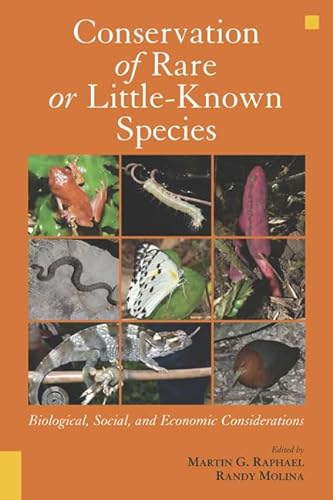Conservation of Rare or Little-known Species: Biological, Social, and Economic Considerations - Hardcover

Some ecosystem management plans established by state and federal agencies have begun to shift their focus away from single-species conservation to a broader goal of protecting a wide range of flora and fauna, including species whose numbers are scarce or about which there is little scientific understanding. To date, these efforts have proved extremely costly and complex to implement. Are there alternative approaches to protecting rare or little-known species that can be more effective and less burdensome than current efforts?"Conservation of Rare or Little-Known Species" represents the first comprehensive scientific evaluation of approaches and management options for protecting rare or little-known terrestrial species. The book brings together leading ecologists, biologists, botanists, economists, and sociologists to classify approaches, summarize their theoretical and conceptual foundations, evaluate their efficacy, and review how each has been used.Contributors consider combinations of species and systems approaches for overall effectiveness in meeting conservation and ecosystem sustainability goals. They discuss the biological, legal, sociological, political, administrative, and economic dimensions by which conservation strategies can be gauged, in an effort to help managers determine which strategy or combination of strategies is most likely to meet their needs. Contributors also discuss practical considerations of implementing various strategies."Conservation of Rare or Little-Known Species" gives land managers access to a diverse literature and provides them with the basic information they need to select approaches that best suit their conservation objectives and ecological context. It is an important new work for anyone involved with developing land management or conservation plans.
"synopsis" may belong to another edition of this title.
Review:
"An insightful look at what constitutes rarity and a much-needed synthesis of how resource professionals can evaluate and ultimately conserve rare species. This book debunks the false dichotomy between management for biodiversity versus management for rare species."--Michael L. Morrison "Caesar Kleberg Chair in Wildlife Ecology and Conservation, Texas A&M University "
"Seldom are rare or poorly known species--often invertebrates and nonvascular plants--the targets of conservation planning. The consequence of such oversight for biodiversity conservation is the topic of this well-edited book, targeted to scientists who work closely with land managers to conserve terrestrial biodiversity and to managers responsible for implementing conservation strategies. The scope is broad, addressing legal, social, economic, and political issues as well as the obvious scientific challenges. This book clearly fills a gap in conservation biology literature by emphasizing the potential importance of species that often constitute the majority in many ecological communities."--Barry Noon "Department of Fish, Wildlife, and Conservation Biology, Colorado State University "
"It is one thing to assemble the biological knowledge and political will to conserve rare species. It is another to do so for species we barely know and appreciate, like microspiders and snow fleas. This volume shows us with exceptional clarity that both rare and little-known species can be conserved. No, they must be conserved. We all will benefit from this book as it motivates, teaches, and enlightens land managers to conserve biological diversity in all its finery."--John M. Marzluff "Professor of wildlife science, University of Washington "
About the Author:
"Seldom are rare or poorly known species--often invertebrates and nonvascular plants--the targets of conservation planning. The consequence of such oversight for biodiversity conservation is the topic of this well-edited book, targeted to scientists who work closely with land managers to conserve terrestrial biodiversity and to managers responsible for implementing conservation strategies. The scope is broad, addressing legal, social, economic, and political issues as well as the obvious scientific challenges. This book clearly fills a gap in conservation biology literature by emphasizing the potential importance of species that often constitute the majority in many ecological communities."--Barry Noon "Department of Fish, Wildlife, and Conservation Biology, Colorado State University "
"It is one thing to assemble the biological knowledge and political will to conserve rare species. It is another to do so for species we barely know and appreciate, like microspiders and snow fleas. This volume shows us with exceptional clarity that both rare and little-known species can be conserved. No, they must be conserved. We all will benefit from this book as it motivates, teaches, and enlightens land managers to conserve biological diversity in all its finery."--John M. Marzluff "Professor of wildlife science, University of Washington "
Martin G. Raphael is a research scientist with the U.S. Forest Service, Pacific Northwest Research Station, where he leads research on conservation of biological diversity and population ecology of at-risk wildlife. Randy Molina recently retired as a research scientist with the U.S. Forest Service, Pacific Northwest Research Station, where he led the forest mycology team on issues of fungal ecology, ecosystem function, conservation, and management. He owns a mycological business and is an adjunct professor for Oregon State University.
"About this title" may belong to another edition of this title.
- PublisherIsland Press
- Publication date2007
- ISBN 10 1597261653
- ISBN 13 9781597261654
- BindingHardcover
- Number of pages392
- EditorRaphael Martin G., Molina Randy
£ 8.07
Shipping:
£ 3.90
Within U.S.A.
Top Search Results from the AbeBooks Marketplace
Conservation of Rare or Little-Known Species: Biological, Social, and Economic Considerations
Seller:
Rating
Book Description Hardcover. Condition: Near Fine. Book is in great shape. Pages are bright, clean and the binding is tight. Only light overall shelfwear. Seller Inventory # 812906
Buy Used
£ 8.07
Convert currency

